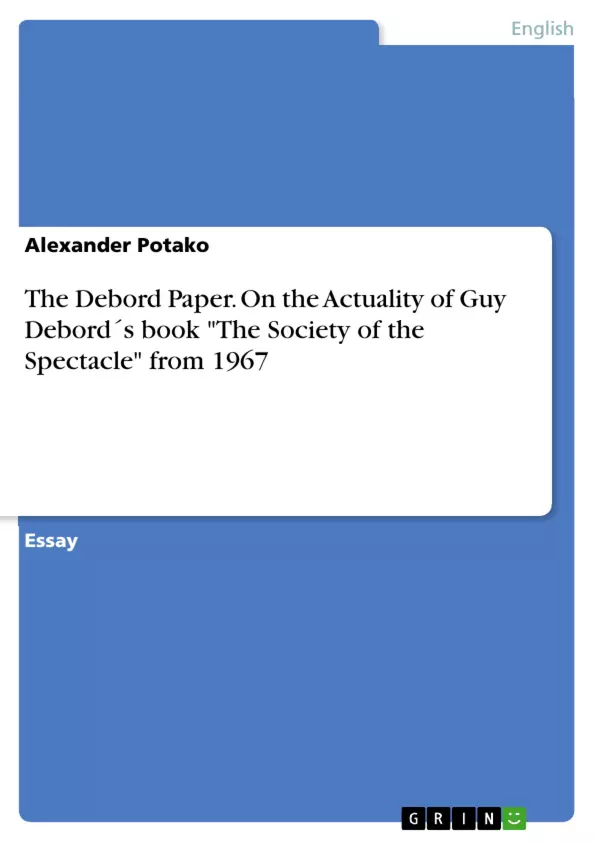This work aims to analyse Gyu Debord´s book "The Society of the Spectacle" and the actuality of the indications given in that book.
Even though it is not quite a widespread attitude fulfilled in practice, analysing whether certain theoretical legacy of the past could be regarded as appropriate and valuable to the contemporary times is without any doubt appears to be a procedure that might provide one with productive outcomes.
As far as Guy Debord is concerned in particular, his ideas definitely refer to a potential list of conceptions that need to be reconsidered today. This assumption could be explained at least by the fact that his basic positions presented in the well-recognized book "The Society of the Spectacle" (1967) obtain both critical and appreciative perceptions, which in fact are going to be discussed further. Nevertheless, it could be easily suggested that Debord’s statements are still relevant to the contemporary context, when technologies that constitute specificity of media are significantly advanced.
While some of his theses could be used while describing practices people apply to while using social media, others eloquently represent a range of aspects that are crucial to analysis, as an instance, of celebrity culture. That is why it is important to state that the profound indications of Guy Debord articulated back in 1967, preserve their actuality these days as well.
Inhaltsverzeichnis (Table of Contents)
- Separation Perfected
Zielsetzung und Themenschwerpunkte (Objectives and Key Themes)
The aim of this paper is to analyze the applicability of Guy Debord's theories on the "society of the spectacle" to the contemporary context, specifically considering the influence of advanced media technologies. The paper explores the main ideas presented in Debord's The Society of the Spectacle (1967) and examines how they resonate with contemporary social phenomena such as celebrity culture and social media usage.
- The concept of the spectacle as a social relationship mediated by images
- The loss of authenticity in a society dominated by spectacle
- The role of technology and media in perpetuating the spectacle
- The impact of spectacle on individual identity and social interactions
- The relationship between the spectacle and the prevailing economic system
Zusammenfassung der Kapitel (Chapter Summaries)
The first chapter, "Separation Perfected," introduces the central concept of the "society of the spectacle" as a pervasive phenomenon in which all aspects of social life are presented as a spectacle. Debord argues that this spectacle is not merely a collection of images but a social relationship that is mediated by images, leading to a loss of authenticity and a distorted perception of reality. He draws upon Marxist theories of socio-economic formations and class antagonisms to explain the origins and consequences of the spectacle. The chapter examines the nature of the spectacle as a self-portrait of power and explores how individuals are increasingly alienated from their own lives and identities within this spectacle.
Schlüsselwörter (Keywords)
The main keywords and focus topics of this paper include: the society of the spectacle, Guy Debord, The Society of the Spectacle, media technologies, celebrity culture, social media, authenticity, alienation, consumer society, economic system, Karl Marx, technological advancement, spectacle as a social relationship, media influence, contemporary culture.
Frequently Asked Questions
What does Guy Debord mean by "The Society of the Spectacle"?
Debord argues that modern society is a social relationship mediated by images, where representation is more important than actual living.
Is Debord's 1967 theory still relevant today?
Yes, the paper suggests his ideas are highly relevant to contemporary phenomena like social media usage and celebrity culture.
How does the "spectacle" relate to alienation?
The spectacle leads to a loss of authenticity, as individuals become increasingly alienated from their own lives and identities within a world of images.
What is the link between the spectacle and Marxism?
Debord draws on Marxist theories of socio-economic formations and class antagonisms to explain how the spectacle serves as a self-portrait of power.
How does social media fit into Debord's framework?
Social media practices can be seen as modern extensions of the spectacle, where life is curated and presented as a series of images for consumption.
- Citar trabajo
- Alexander Potako (Autor), 2016, The Debord Paper. On the Actuality of Guy Debord´s book "The Society of the Spectacle" from 1967, Múnich, GRIN Verlag, https://www.grin.com/document/465797



